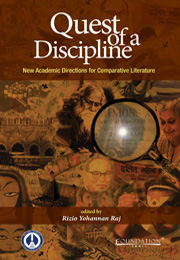Book contents
- Frontmatter
- Contents
- List of Contributors
- Acknowledgements
- Prologue to the “Quest'
- Introduction
- PART I Traditions and Manifestoes: Reflecting on Perspectives
- PART II The Quest Motif: Redefining the Scope of Comparative Literature
- PART III The Dynamics of Exchange: Genres, Areas and Disciplines
- PART IV India: A Curious Comparative Space
- Afterword: Comparative? Literature?
- Index
Afterword: Comparative? Literature?
Published online by Cambridge University Press: 05 June 2012
- Frontmatter
- Contents
- List of Contributors
- Acknowledgements
- Prologue to the “Quest'
- Introduction
- PART I Traditions and Manifestoes: Reflecting on Perspectives
- PART II The Quest Motif: Redefining the Scope of Comparative Literature
- PART III The Dynamics of Exchange: Genres, Areas and Disciplines
- PART IV India: A Curious Comparative Space
- Afterword: Comparative? Literature?
- Index
Summary
The essays in this volume collectively testify to the creative ferment of Comparative Studies today, as scholars around the world explore the possibilities – and confront the dangers – presented by a newly global world and its seductive new media. A recurrent fear felt by comparatists, and also by many specialists in individual languages, is that the growing hegemony of global English will swallow up other languages and literary cultures. As can be seen in the essay by Kanika Batra and elsewhere in this volume, the concern is that a linguistically and culturally ungrounded ‘World Literature’ based in English departments may eclipse – or may already have eclipsed – the fine-grained study of works in a variety of languages, the traditional philological strength of Comparative Literature. Yet the rise of English as a scholarly lingua franca does not in itself preclude close attention to other languages. English, indeed, is becoming an effective medium for the sharing of knowledge across many linguistic boundaries, enabling scholars around the world to communicate and to share their linguistically specialized knowledges. I have certainly found this to be the case in recent visits to Bucharest, Hanoi, Seoul, and Tehran, where in each case scholars from differing countries, often working in languages rarely if ever pursued by an older generation's comparatists, were able to share their findings together.
Even in the United States, both in English departments and all the more within programs of Comparative Literature, serious comparatist work continues to involve close attention to language and culture.
- Type
- Chapter
- Information
- Quest of a DisciplineNew Academic Directions for Comparative Literature, pp. 280 - 289Publisher: Foundation BooksPrint publication year: 2012
- 1
- Cited by



